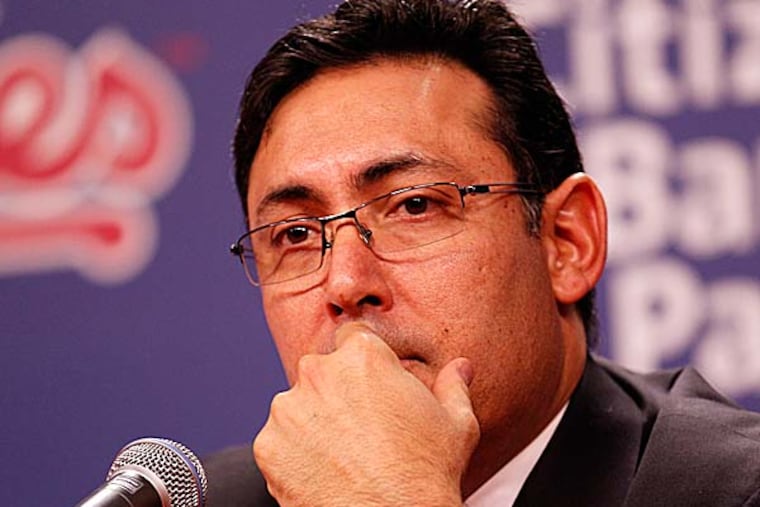Amaro now plans to spend 'wisely'
The big, bad contracts that weigh them down leave Ruben Amaro shopping in the dollar store.

THREE YEARS AGO, Ruben Amaro Jr. could barely walk out of his house to fetch the mail or sneak out of a hotel for a cup of coffee without hearing the same question over and over and over.
Why did you trade Cliff Lee?
The back-and-forth with the fans back then, however, was mostly in good fun. The Phillies were fresh off back-to-back World Series appearances and even though they had traded Lee, the Phillies did add Roy Halladay, arguably the best pitcher in the game.
Three years later, the Phillies are not coming off consecutive World Series appearances. They are coming off back-to-back seasons that ended without a trip to the playoffs.
The chatter aimed at Amaro has turned angry and agitated. He was handed the keys to a team that won a World Series five autumns ago and has watched it spiral backward with each passing season.
"That's an occupational hazard," Amaro said of hearing the criticism. "That's a part of it."
If there's one thing clear in the 2 1/2 months since the 2013 season ended, it's this: Amaro will not try to tune out his critics by throwing money around to whoever might take it this offseason.
Three winters removed from shocking the baseball world by reacquiring Lee by way of a $120 million free-agent paycheck, Amaro has decided to take a different approach. He's spending less and handing out money more judiciously.
Instead of Carlos Beltran, Shin-Soo Choo or Curtis Granderson to upgrade the outfield, Amaro signed Marlon Byrd. Rather than opening the wallet for Ubaldo Jimenez, Matt Garza or A.J. Burnett to replace Roy Halladay, Amaro brought in Roberto "Fausto Carmona" Hernandez.
Amaro built his reputation as a general manager by aggressively pursuing All-Star players on the trade and free-agent markets, and not shying away from the big dollar signs that were next to those names. With his job security likely dwindling, Amaro has taken a decidedly different route in attempting to turn his aging team into a contender again.
"It's about spending the money wisely, and trying to spend it intelligently," Amaro said yesterday afternoon at a news conference at Citizens Bank Park. "Why would you spend money that you think is going to be money not well-spent? That's the important part. With the way the market is set up right now, I'm not real comfortable with going the extra mile with some of the guys that are out there still that may improve us a little bit, but in the long run may be detrimental to us."
The irony, of course, is that "money not well-spent" could be fitting words for the epitaph of Amaro's GM career.
Among the casualties: Jonathan Papelbon's 4-year, $50 million deal, a record for a reliever and a contract the Phillies would love nothing more than to trade before 2014; Ryan Howard's 5-year, $125 million deal, signed 2 years before he could become a free agent and kicking in the year he spent half the season recovering from Achilles' surgery; Jimmy Rollins' contract that will likely net the declining shortstop a grand total of $44 million over 4 years; and pretty much every free-agent reliever Amaro has signed in the last 4 years.
The Phillies are directionless - trying to win with an aging veteran core without spending more, and hoping to get younger without committing to a full-bore rebuilding mode - because the money was not spent wisely for a large portion of the last 4 years.
The Phillies are not adding the likes of Jacoby Ellsbury, Robinson Cano and Ricky Nolasco, because they've spent that money on Howard, Papelbon, Rollins and others.
"We've committed to them," Amaro said, "and we have to roll with them."
That's probably not the kind of marketing campaign the ownership would like to see on a billboard on I-95. But it's reality.
And it's also why Amaro is shying away from spending close to the luxury-tax threshold ($189 million) and stubbornly insisting that he can field a winner at a payroll similar to last year's $168.5 million. Yesterday, Amaro said he doesn't expect to add another major league contract with the exception of "a little bit of help" for the bench.
The projections are far from 100 percent accurate, but after coming to terms with all of their arbitration-eligible players within the next 2 months, the Phillies payroll likely will be $25 million to $30 million under the luxury-tax threshold.
From Amaro's standpoint, however, it's not the money you spend but how you spend it.
The "asks" might be high among free agents looking to cash in this winter. But they're no higher than Amaro's in hoping Phillies fans will have faith in the players the general manager is counting on heavily in 2014.
"We've had great support from our fans and they've been very supportive of our players," Amaro said of trying to contend with a team filled with question marks.
"But they have to understand that Ryan Howard does still live, he exists and he's still part of our club. He's one of the most important parts of our club. Guys like Ben Revere still exist and these are people who are on our club. We have to hope that they play at the level that we expect them to play."